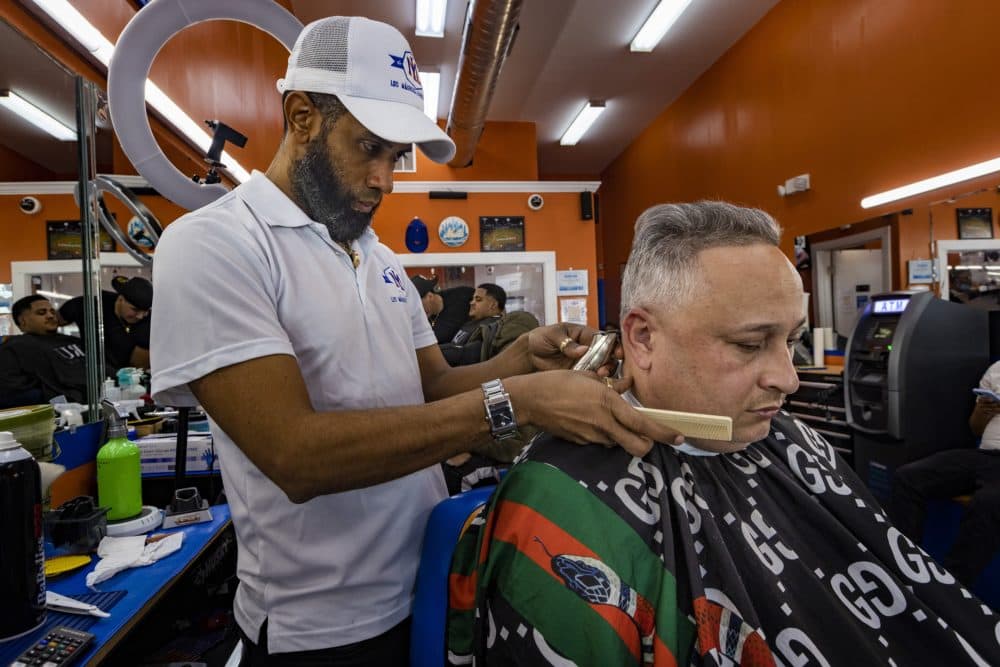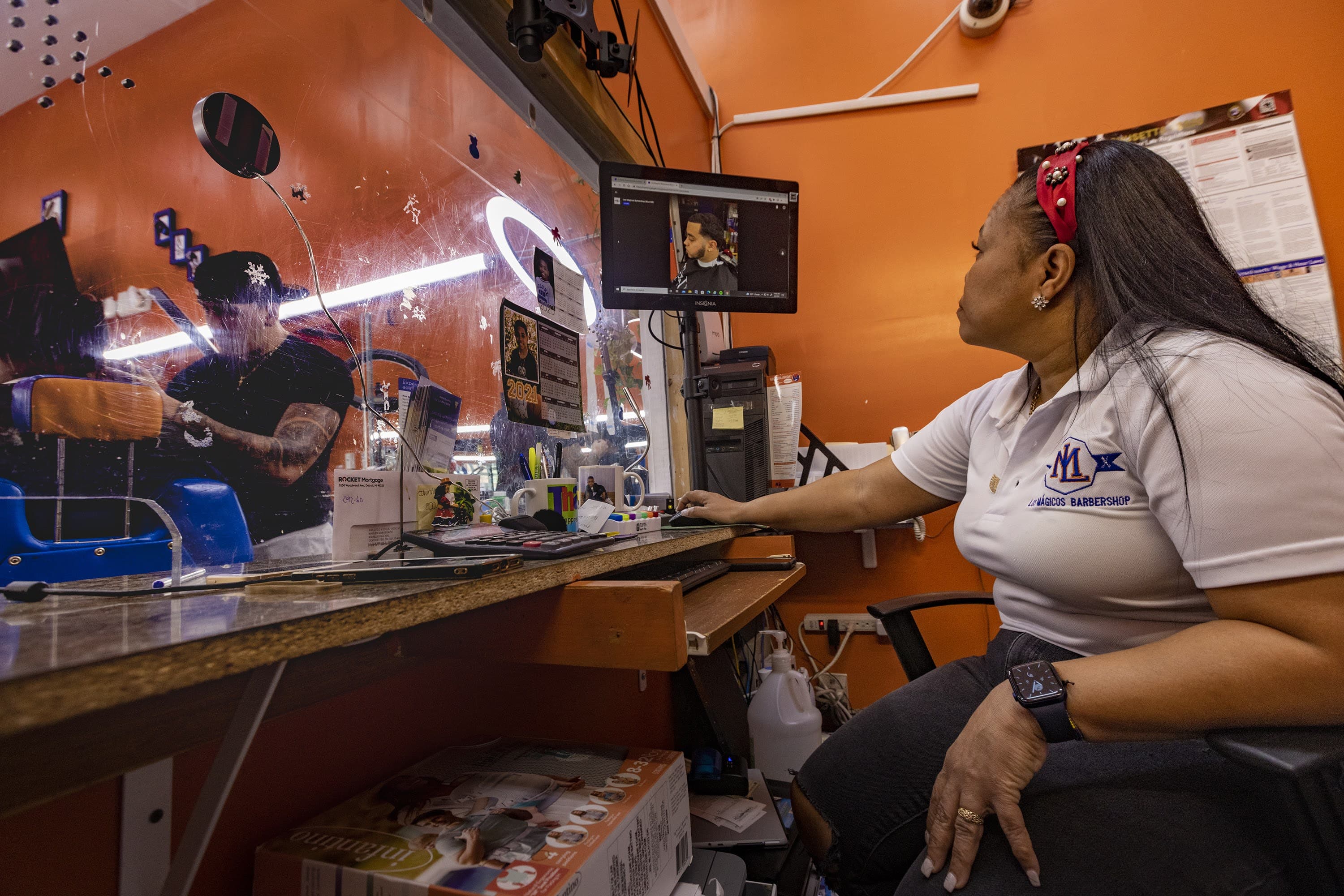Advertisement
The pandemic forced these immigrant-owned businesses to go digital. It's paying off
Resume
During the pandemic, Carlos Espinoza-Toro's mission was to help small businesses survive. For him, the last two years felt more like 200.
"It was one after another, after another," he said of his growing list of clients in need. "Thirty minutes, next, next, next."
Espinoza-Toro worked as a director at the Jamaica Plain Neighborhood Development Corporation, a Boston area nonprofit whose mission is to increase economic prosperity for people of color. His team of three supported mostly immigrant-owned businesses by helping them develop marketing plans or apply for loans and other services.
In 2020, their task became more urgent than ever.
"If we wouldn’t have been here to help these folks, we would have had boarded up storefronts in the middle of the biggest corridors here in the city of Boston," Espinoza-Toro said.
Immigrants own nearly a quarter of small businesses in Massachusetts, even though they make up only 17% of the state's population, according to the American Immigration Council, a nonpartisan think tank. Many faced particular challenges during the pandemic because they lacked the technology, financial reserves or relationships with lenders that might help them weather months of COVID-related disruptions.
In 2020, Espinoza-Toro and his team got to work on a deluge of applications for federal pandemic business relief on behalf of their clients.
But they kept running into the same problem. A lot of the business owners didn't have their financial documents in order. Many of them wrote down expenses and revenues using pen and paper. Some didn't use email, which made applications — and communication in general — immensely difficult, especially during the pandemic.
"Digital readiness" was a phrase Espinoza-Toro found himself repeating over and over again to his clients.
Before COVID, "digital readiness" wasn't top of mind for Argentina Villar and her partner, Harlen Lara. The couple owns two small businesses in Dorchester: Los Magicos, a barbershop, and LV Home Improvement, a construction and cleaning company.
Together they employ 10 people, a point of pride for Villar and Lara, who immigrated from the Dominican Republic separately a few years before starting their business ventures.
"Because of this business, many people can eat," Villar said in Spanish. "We feel good about giving work to our community."

When the state mandated that all non-essential businesses shut down in March 2020, the couple reached out to Espinoza-Toro for help. In addition to working with Villar and Lara to apply for grants, his team also helped them transform parts of their businesses using digital tools.
These days, while Lara perfects the fade on one of his barbershop customers, Villar pulls up an application called Booksy. It allows clients to book appointments online. The application also helps her find new customers and keep track of who's coming back.
"Before, clients just called their barber, but sometimes they had to wait a while," Villar said. "This is faster."
Villar also started advertising both businesses on social media. She posts photos of fresh haircuts on the Los Magicos Instagram account. For the construction and cleaning company, she adds pictures of newly renovated bathrooms and sparkling clean floors.
"I was afraid at first because even though I used email, I wasn't a very digital person," Villar said. "I had to practice."
In general, more businesses in Massachusetts have gone digital during the pandemic. According to the Retailers Association of Massachusetts, 26% of its members were doing business online as well as in-person before 2020. Now more than 60% are. Espinoza-Toro estimates that 80 businesses he's worked with permanently implemented some kind of new digital system over the last two years.
He sees the businesses owners he's been helping as more than a financial backbone for the local economy. They’re a cultural cornerstone.
"They are actually creating a place for people from that immigrant community to come together, have a good meal, socialize, et cetera," he said. "So that's the really important part."
For Villar, those countless, sometimes frustrating, hours developing new digital skills seem to be paying off.
On a neatly organized spreadsheet, something else she recently learned how to use, Villar points out some solid returns.
The barbershop, which was barely breaking even in 2020 even with pandemic assistance funds, made a $17,000 profit in 2021. Pre-tax profit for the construction and cleaning business quadrupled during that same time period, to around $123,000.
Although the new technology isn't the only factor, Villar believes it played a big role in the growth of her businesses.
"It’s better," she said. "We can find everything fast, and you become organized."
Another benefit of this digital transformation has less to do with dollars and cents. Villar said she feels more confident as a business owner. That confidence also extends to other parts of her life. The couple is saving up to buy a home for their family of six. Being able to more easily navigate their finances will hopefully make that process easier.
Reina Rapalo, the owner of Catrachitos Family Daycare in Jamaica Plain, said learning to effectively use video conferencing has been crucial for her business during the pandemic. She primarily used it to communicate with parents.
"We had to innovate and change," she said. "We cannot be left behind."
This segment aired on April 20, 2022.
